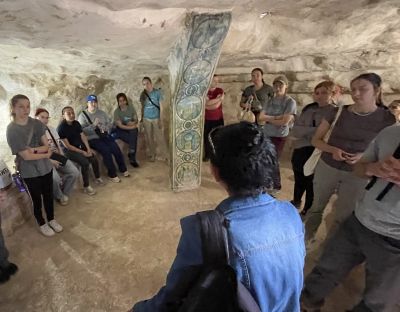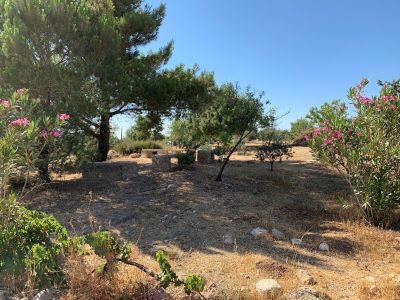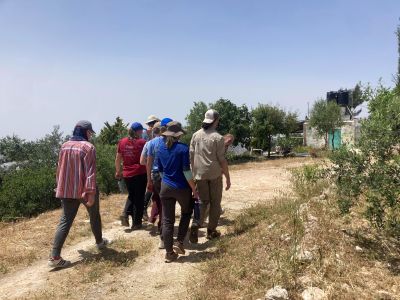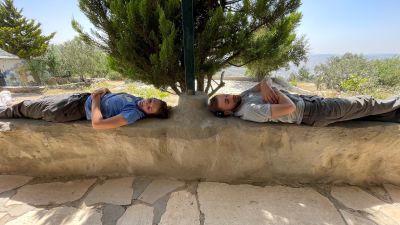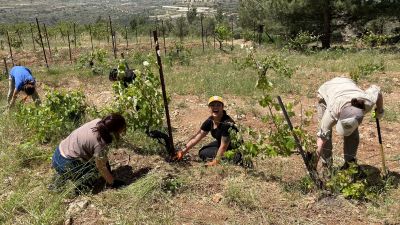“The Tent of Nations”
Meredith Blossom
During our trip to Israel/Palestine, we had the opportunity to volunteer at Tent of Nations, a hill farm that has been owned by the Nassar family for over 100 years. We were able to talk and work with siblings Daoud, Amal, and Daher. We planted olive trees, weeded fields and shared ideas for future improvements to the farm over tea and coffee.
While at Tent of Nations, we learned a lot about the situation that the Nassar family faces. The farm is surrounded by five rapidly expanding illegal Israeli settlements, and the family has been in a 32-year legal battle with the Israeli government for control over their land. This is because the government is claiming their land is “state land,” citing an Ottoman period law which states that if land is not cultivated for three years, it becomes state land. This legal application is blatantly wrong, however, as the family has been cultivating the land since Ottoman rule, and they have registration papers from the same period as evidence of their ownership.
Nevertheless, the Israeli government continues to try to take the land by means of repetitive and exhausting legal proceedings in the military court. The family is further burdened by the actions of some of the nearby Israeli settlers, who use scare tactics, vandalism and violent attacks. For instance, government and settler groups have bulldozed fruit trees days before harvest time, tried to build roads through the Nassar property, and have cut down over 250 olive trees. Settlers have even inflicted physical violence on members of the Nassar family. On the legal side, the Tent of Nations is caught in a seemingly endless cycle of the Nassar family trying to prove ownership and reregister the land and the court ruling there is “not enough evidence.” Demolition orders – 28 and counting – are even continually hidden around the property, forcing the family to first find the notices and then appeal against them. And egregiously, the farm’s access to electricity, water and building permits have all been denied.
What is happening to the Tent of Nations is an example of multiple mechanisms of the Israeli occupation of Palestinians. The reason this land is so sought after by the Israeli government can be summarized by two factors: separation and control. With the Nassar family’s land, the Israeli government would have control over all of the hill tops in a large area, connecting the encircling illegal settlements and possibly gaining control of the Palestinian village in the valley next to the Tent of Nations. Another factor in this separation is the ever-expanding wall that cuts into Palestinian territory, separating Palestinians from land, resources, and each other.
When I was out in the fields, pulling weeds and working under the hot sun, I found myself forgetting about all of these factors even though the ground, the land, was right in front of me. I was thinking about the task at hand, or how long until the next break, or how I was really hot and my sunburn was hurting. But the moment I took a breath and looked up at the landscape, at the Israeli settlements in every direction, I was immediately reminded of all that I had learned and all that has happened for this view to look the way it does. I was also reminded of how this is a mechanism of occupation: the ever-present sight of the expansion, of the separation and control, that is both shocking and scarily mundane at the same time.
Despite the constant efforts of the Israeli courts and some of the settlers to get rid of Tent of Nations, the Nassar family has never given up hope in the future. They have always had their sights set on constant improvement and growth, both figuratively and literally. For example, they responded to the lack of electricity and water by using solar power, rainwater collection systems, and compost toilets. In response to the attacks and the destruction of hundreds of trees, the family has replanted and regrown what was lost. They have also successfully built an international community of volunteers for outreach, awareness, and mutual learning – they are continually searching for new, creative ideas for survival and growth.
More than anything, the family has been continually dedicated to nonviolence and justice. They refuse to be victims, they refuse to hate, and they “refuse to be enemies,” a phrase that is now their motto. They have only retaliated against the attacks to their home in court and they have continued to resubmit their ownership documents even after continual setbacks and stagnation in a repeated cycle. They have not given up hope and have always relied on justice to guide them to a better future.
While volunteering at the Tent of Nations, I was inspired by the family’s ability to adapt to the situation they are in, and I think their example says something about the adaptability of the human race. They have gone through so much hardship and injustice, and they continue to do so, but they still have so much hope and love and resilience within them. I’ll spend the rest of my life trying to be as strong as they have been forced to be their entire lives.





